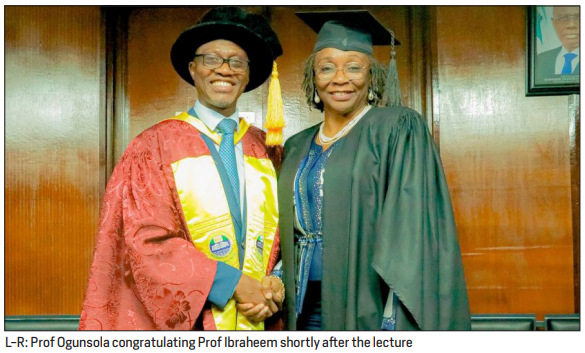INTEGRITY Concerns have been raised over integrity crisis affecting journalism practice in Nigeria, with a call on practitioners to redirect the focus of journalism or media practice in the country
Theirs is a consensus: to redirect the focus of journalism or media practice especially in Nigeria, in the face of unethical practice, lack of professionalism, untoward misdemeanor and integrity crisis already defacing the profession. This was the main thrust of the fifth inaugural lecture of the University of Lagos (UNILAG), where for almost two hours last week, media practitioners and journalists were tasked with the need to redirect the focus of journalism or media practice in Nigeria.
The lecture, with the theme: “Casino-Journalism and the End of History,” was delivered by Prof Ismail Adegboyega Ibraheem, a Professor of Journalism and Communication Studies, Department of Mass Communication, Faculty of Social Sciences, who held his audience spellbound as he x-rayed the unguarded practices in journalism and media practice in the country, which calls for sober reflection and a change.
Inundated by these challenges, the inaugural lecturer called for a reformation or rectification of media practices to prioritise ethical journalism, factual reporting and analysis, as well as media integrity at this sensational age.
It was the fifth inaugural lecture of the University of Lagos (UNILAG) for the 2024/2025 academic session, which was delivered by a Professor of Journalism and Communication Studies, Department of Mass Communication, Faculty of Social Sciences, Ismail Adegboyega Ibraheem.
Dignitaries at the inaugural lecture, which took place at the J. F. Ade-Ajayi Auditorium were the Vice-Chancellor, Prof Folasade Ogunsola, who chaired the lecture; former Deputy ViceChancellor (Management Services), Emeritus Professor Olayide Abbas; Vice-Chancellor of Lagos State University of Education (LASUED), Prof Bidemi Biliquees Lafiaji Oguneye, who represented Registrar of JAMB, Prof Is-haq Oloyede; Prof Ayodele Francis Ogunye, and former ViceChancellors of the university, Professors Rahmon Adisa Bello, and Oluwatoyin Ogundipe, among others.
Lecture
The fifth inaugural lecture, which marked the final inaugural lecture of the university for 2024 academic session was: “Casino-Journalism and the End of History.”
In his treaties, Ibraheem, an alumnus of the university, provided a brief background on how he engaged with and navigated the intricate media construction of reality during his years at the Civil Liberties Organisation (CLO), saying the collaboration between CLO and the media marked a turning point in the Nigerian media.
But, despite collaboration of human right organisations with the media, especially during the military era in the 90s, he wondered that securing front-page coverage for certain human rights issues, remained a challenge, largely due to the political economy of mass media organisations.
While alluding to the fact that it is true that a failing media system contributes to some societal challenges, Ibraheem also noted it is merely one factor among a multitude of elements shaping our world.
Reflecting on a fundamental question of what should be the role of journalism and the media in society, Ibraheem insisted that to address this, there is the need to critically evaluate how the media has met societal expectations, exploring the realities and current challenges of journalism from which the theme of the lecture evolved.
Recalling the second and last inaugural lecture from the Department of Mass Communication of the university, which was delivered 21 years ago by Prof Ralph Afolabi Akinfeleye, who framed journalism in Nigeria as being caught between two identities: the Fourth Estate of the Realm and the Fourth Estate of the Wreck, Ibraheem stated that this dual characterisation underscores the intrinsic connection between journalism’s performance and society’s governance structures.
The inaugural lecturer, who said that “media platforms, as the primary vehicles of journalism, play a critical role in this dynamic,” even as he noted that his lecture:
“Casino Journalism and the End of History,” seeks among others to expand on this question: “Is journalism the Fourth Estate of the Realm or the Fourth Estate of the Wreck? However, Ibraheem explained that whichever way, without urgent intervention journalism practice in Nigeria is sliding dangerously toward the wreck.
Added to this, he lamented that today, we may be sleepwalking into the ruin of societal structures, driven by a media ecosystem under threat from various forces, such as the rise of blogs and clickbait-driven content; the pervasive influence of foreign-owned media shaping our consciousness in Nigeria; the increasing reliance on news sourced from social media platforms often from sources lacking credibility; journalism culture that promotes sensationalism over substance; and the prevalence of news aggregation sites that prioritise sensationalism over substance.
Ibraheem recalled that “Casino Journalism” as the theme of the inaugural lecture, was greeted by some intrigues in some quarters, who offered certain interpretations as kalo-kalo journalism, eyi je, eyi o je journalism (this eats, this does not eat kind of journalism), cocktail journalism, and, of course, brown envelope journalism.
“Many of my friends lauded the theme after my explanations to them, believing it would finally confront the scourge of unethical practices such as brown envelope journalism.
“However, my position is that reducing the crisis in journalism to brown envelope practices alone risks oversimplifying and cosmeticising what is, in truth, a systemic, structural, and existential problem within the industry,” he said. On Casino Journalism: A Framework for Understanding, the inaugural lecturer explained what casino journalism is about, and what the “end of history” means in this context.
According to him, these are the central questions the lecture is aimed to unpack as the concept of casino journalism is his critique of the evolving media landscape, one where randomness, sensationalism, and profit-driven motives dominate the journalistic enterprise. In such a landscape, journalistic integrity and the public good are often sacrificed for short-term gain and sheer adventurous clicks.
The lecture further stated: “The players, for real they are, wanted to pop up everywhere online without being sought and are quick to offer bait of data often to enable unsuspecting audiences to lap up their hogwash, and they do not stand by any fact.
“Casino journalism describes a style of media reporting in which sensationalism, entertainment, and spectacle overshadow thorough investigation and factual accuracy. It derives its name from the notion that journalism, instead of being a serious pursuit of truth, has become a game in which the media stakes its credibility for high ratings, clicks, advertising revenues, and personal gains.
“The “end of history,” a metaphor from Francis Fukuyama’s End of History and the Last Man in this context, reflects the existential risk these practices pose to journalism’s role as a cornerstone of democracy. When journalism loses its compass, we risk a society devoid of critical inquiry, accountability, and truth: a society where history ceases to evolve in its truest sense.”
According to Ibraheem, the intersection of casino journalism and the “End of History” in Nigeria creates a peculiar situation in which the media not only misrepresents current events, but also frames historical narratives to prevent meaningful political or ideological debate. This lecture, he added, aims at exploring how these two concepts – Casino Journalism and the End of History – shape public discourse and historical understanding in Nigeria.
“In any society, the media are indispensable in shaping public discourse, influencing societal attitudes, and framing historical narratives. Casino practices that are now endemic in the media industry in Nigeria deprive us of this important value addition to society by journalism.
“This phenomenon is particularly pervasive in the Nigerian media landscape, where the 24-hour news cycle, political tensions, and economic struggles create a fertile ground for shallow, sensational coverage.”
He listed the key features of casino journalism to include sensationalism, where news stories are often exaggerated or distorted to attract attention and provoke an emotional response; entertainment over substance under which media outlets prioritise stories that will engage viewers or readers on an emotional level rather than those that are factually important or analytically significant;
focus on ratings and clicks, where the need for revenue drives media outlets to produce content that appeals to the lowest common denominator, thus sacrificing depth for widespread appeal; as well as speculation and conjecture in which news outlets often engage in guesswork or rely on anonymous sources without solid evidence, further undermining journalistic credibility.
Issues
However, the inaugural lecturer stated that good journalism serves as a tool for holding power to account by exposing corruption, human rights abuses, and corporate malfeasance.
Curiously, Ibraheem noted that as its value, journalists hold governments, corporations, and other institutions accountable for their actions by digging beneath the surface and asking tough questions, often sparking reforms and encouraging transparency.
Drawing from his vast expertise in journalism, communication studies, and international relations, Prof Ibraheem, who shed light on the crucial relationship between media integrity and democratic resilience, further described the concept of Casino Journalism, as a sensational and profit-driven form of media that prioritises entertainment and viral content, over factual and ethical reporting.
This practice, he argued, compromises the quality of public discourse, reduces critical issues to sound bites, and undermines informed civic participation.
The lecture referenced several infamous cases in Nigerian media history, among which is the Abacha 2 Million Man March, which he explained, was misrepresented by a sensationalised narrative from the CLO.
He, therefore, argued that the CLO’s use of ‘Casino journalism’ tactics to delegitimise the march not only amplified sensationalism, but also diverted attention from the deeper issues of governance, human rights, and democracy.
With casino journalism particularly prevalent in Nigeria, Ibraheem drew the audience’s attention to other far-reaching examples that underscore how stories about politics, corruption and social crises are often embellished to capture public’s attention.
Similarly, he noted that the “End of History” is a dangerous trend in which critical reflection on societal and historical issues is replaced by a complacent and oversimplified understanding.
The lecturer, whose interdisciplinary collaborations focuses on tackling evolving challenges of the media world, declared that journalism often fails to challenge power structures, but instead becomes complicit in perpetuating superficial narratives that serve the interests of the powerful, rather than the public good.
Ibraheem, therefore, cautioned that this trend jeopardises democracy by encouraging passive citizenship, where complex political and social issues are reduced to headlinedriven content devoid of depth, even as he warned that the shortterm gains of sensationalism are ultimately harmful to democratic engagement and historical accuracy.
Therefore, Ibraheem stressed the importance of a responsible media system that empowers citizens, fosters critical engagement, and serves as a vigilant watchdog for democracy, even as he argued that the media must reject sensationalism in favour of deep, ethical journalism that informs and educates the public.
The inaugural lecturer, who also insisted that the future of democracy is closely tied to the integrity of its media system, however, called on all stakeholders’ journalists, academics, and citizens to uphold and protect media integrity, as a means to safeguard democratic values and ensure a free and responsible press.
Meanwhile, the inaugural lecture not only provided a scholarly critique of current media practices, but also served as a timely reminder of the transformative role journalism must play in safeguarding democratic ideals in an era of rapid technological change.
Recommendations
The inaugural lecturer in his 102-page lecture recommended that to safeguard the future of media and journalism in Nigeria, stakeholders in the media industry must adopt innovative funding mechanisms, interdisciplinary in education, and advocate for ethical practices that prioritise the public good over private interests.
This approach, he said, promises a resilient media system capable of navigating societal challenges while upholding democratic ideals, and ultimately paving the way for a brighter future for the industry in Nigeria.
He spoke of the need for a media ombudsman, who will protect the government, public, and voiceless individuals against irresponsible and casino-like media performance, with fair and balanced efforts that must be sustained and allowed to trickle down to individual newsrooms.
Since some of the media’s unprofessional practices are rooted in the absence of a sustainable funding model to protect independent media in Nigeria, he recommended the needed collaborative effort with the Federal Ministry of Digital Economy to advocate for more equitable distribution of advertising revenue from major tech giants such as Google and Meta to support independent media organisations, an idea that is already gaining traction globally.
He stated that since financial stability is key to media sustainability, in the face of dwindling advertising fortune and the accompanying “advert politics” that often lead to censorship, it is important for the media to consider robust and sustainable revenue generation streams that could support media independence and enhance the watchdog roles.
Though establishing foundations by media houses to attract funding support from philanthropic organisations, as exemplified by some entities as a good initiative, which he suggested should also be moderated to avoid the imperialists taking over our newsrooms disguising as funders.
Vice-chancellor
The Vice-Chancellor, Prof Folasade Ogunsola, in her remarks, said the lecture painted a vivid picture of a media landscape teetering between ethical responsibility and sensationalism.
She, however, lauded the inaugural lecturer for the stimulating and brilliantly articulated lecture, saying casino journalism with its penchant for the dramatic and the superficial erodes critical public discourse, endangers historical contextualisation, and undermines our collective understanding of societal challenges.
“Professor Ibraheem’s exploration into the “End of History” mind-set also exposed a perilous tendency towards complacency in the face of systemic issues, particularly in a nation as richly complex as Nigeria.
“His critique reminds us that the media, when stripped of depth and context, risks serving the interests of the powerful rather than the public good. His call for a transformation in the media system, no doubt, is a clarion call for ethical reporting, factual analysis, and historical accuracy, values that are foundational to a resilient democratic society,” she said.
According to the ViceChancellor, Ibraheem, whose current research focuses on the evolving role of media and civil society in shaping societies, influencing policy, and safeguarding democracy contributions, showed how his research works extend beyond the academic lecture hall.
Ogunsola, therefore, called on practitioners to heed Professor Ibraheem’s call to protect and promote a free, responsible, and resilient media system, while doing so, we will safeguard the future of our democratic ideals.
The Vice-Chancellor stressed: “His (Ibraheem) profound insights into the dangers of sensationalism, the shifting dynamics of modern journalism, and the ethical responsibilities in an era of rapid technological change resonate deeply serves as a reminder that the integrity of our media is closely linked to the health of our democracy.
We are called to uphold journalism that educates, informs, and elevates society; journalism that remains steadfast in truth, equity, and justice.”








